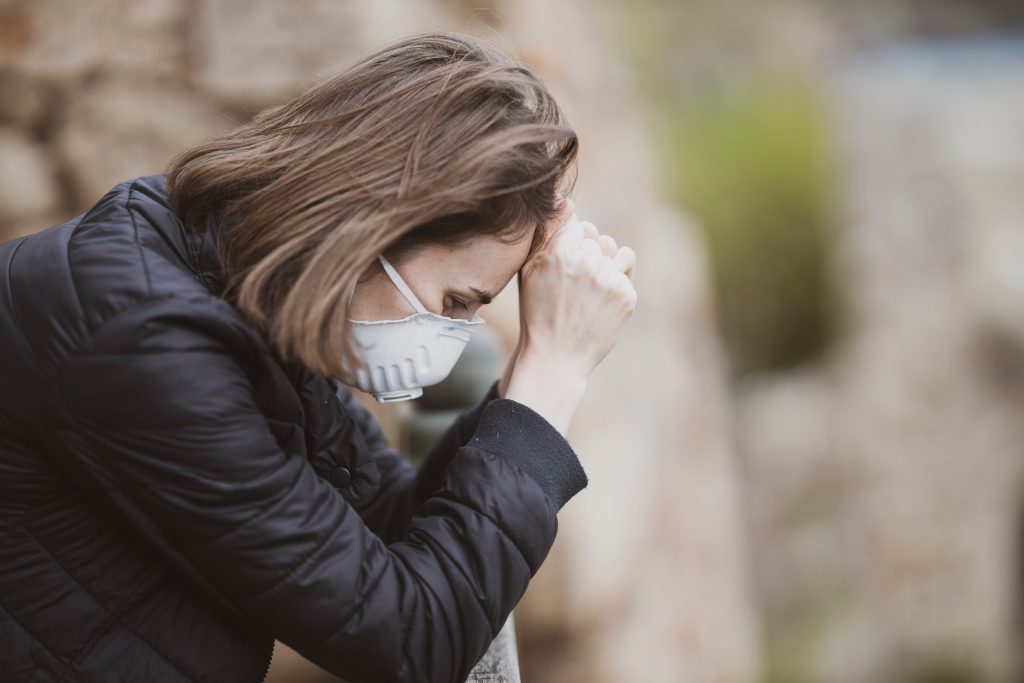
Table of Contents
- Seasonal Allergies Vs. Sinus Infection
- Headaches from Sinus Problems Vs. a Migraine
- When to See a Physician
Seasonal allergies are commonly referred to as “hay fever” despite the fact that much more than hay causes allergic reactions. Allergies are caused by pollens from grasses, weeds, trees, flowers and mold spores, to name a few triggers. The American College of Allergy, Asthma & Immunology says that allergies are the sixth leading cause of chronic illness in the United States, and more than 50 million people suffer from allergies annually. Knowing these facts, it is not surprising that tens of millions of people suffer from an allergy headache and other symptoms that are in addition to sneezing and a runny nose.
Where it gets confusing is understanding the difference between seasonal allergies and sinus infections, both of which can cause neck pain for different reasons.
Seasonal Allergies Vs. Sinus Infection
Sinuses are a connected system of air-filled cavities behind the forehead (frontal sinuses) and cheekbones (maxillary sinuses) and between the eyes (ethmoid sinuses and sphenoid sinus). Normally, the mucous produced by the sinuses drain into the nose.
Seasonal allergies or hay fever is not the same thing as a sinus infection. Hay fever is a condition in which your immune system responds to some stimulus. It is often pollen but could also be dust mites, pollution or smoke. The immune system causes the nasal passages and sinus linings to swell and become inflamed.
Hay fever symptoms include the following.
- Sneezing, often multiple times in a row
- Watery eyes
- Runny or stuffy nose
- Sinus pressure
- Itchy eyes, nose and throat
- Headache
A sinus infection or sinusitis is also an inflammation of the tissues (mucosa) that line the sinuses. The same allergens that cause seasonal allergies can make a sinus infection feel worse. Still, the sinus infection (sinusitis) is caused by bacteria, viruses or fungi, which leads to inflammation in the sinus cavities. It involves more than swelling of nasal passages and sinus linings.
When you have a sinus infection, fluid fills the cavities, and the bacteria, viruses or fungi grow in the fluid. Some physicians prefer the use of the term rhinosinusitis because inflamed sinus cavities are usually accompanied by swollen nasal cavities. Rhino is the medical term for the nose when combined with another term.
Symptoms of a sinus infection, per the Centers for Disease Control, include the following.
- Stuffy nose
- Runny nose
- Headache
- Post-nasal drip in which mucus drips down the throat
- Cough
- Bad breath
- Sore throat
- Facial pain or pressure
- Chronic fatigue

The symptoms of seasonal allergies and sinus infection have some common symptoms, like headaches and stuffy nose. Two of the main differences is a sinus infection may cause facial pain or tenderness, pressure and fatigue. Hay fever is mostly marked by watery, itchy eyes and frequent sneezing.
Seasonal allergies and sinus infections can cause neck or throat soreness. Neck soreness develops from the constant coughing and severe sneezing. Neck muscles tense during these activities, which causes neck pain. Sphenoid sinusitis is inflammation of the sinuses behind the eyes. With this type of sinus infection, neck pain is common, along with an earache and headache at the top of the head or deep within the forehead. A feeling of pressure in front of the throat or neck is usually due to the immune system releasing chemicals in its response to allergens.
Body aches and allergies due to pollen are not common. Body aches are much more likely to occur due to the common cold or a sinus infection.
Headaches from Sinus Problems Vs. a Migraine
There are two types of headaches related to allergies. One is a sinus related headache, and the other is a migraine. Following are some points to keep in mind.
- The headache from allergies is usually localized over the sinus area
- The headache from allergies is the result of inflamed sinus linings
- The headache from sinusitis (sinus infection) is also localized over the sinus area but often is frequently accompanied by facial pain due to pressure
- The sinus obstructed determines where the pain is felt
- Pain can radiate to the jaw, teeth and head, especially with maxillary sinusitis (behind the cheeks)
- Seasonal allergies or a sinus infection can trigger a migraine headache
- The migraine headache is often a severe throbbing pain that is usually felt on one side of the head and gets worse when exposed to sunlight
Migraine headaches are not the same as a sinus-related headache. The cause of migraine headaches is still being researched.
When to See a Physician
When you experience a headache and allergies, it is important to monitor your condition. Symptoms of seasonal allergies usually improve with some basic home treatments like taking nonprescription medications such as antihistamines and decongestants and doing nasal irrigations.
Sinusitis can also be treated with over-the-counter drugs like acetaminophen and naproxen, nasal irrigation, nasal steroids, humidifiers, warm compresses applied to the face and drinking lots of fluids. It is important to see a doctor if complications occur. It is also important to know that migraines are often confused with sinus headaches because they occur in similar locations. Migraines are treated differently than sinusitis. According to the American Academy of Allergy, Asthma & Immunology, pain in front of the head is caused by migraines more often than sinusitis.
There are situations where you need to see a physician.
- A sinus infection does not clear up within ten days after home treatment
- Facial pain with a fever lasts longer than a week
- There is a persistent green or yellow discharge from the nose
- Seasonal allergies seem to be worsening rather than improving
Seasonal allergies and sinus infections are common, but fortunately, most are self-treatable. Do not hesitate to see a doctor though if concerned about your health.
Sources
- https://acaai.org/news/facts-statistics/allergies
- https://www.webmd.com/allergies/picture-of-the-sinuses
- https://www.cdc.gov/antibiotic-use/community/for-patients/common-illnesses/sinus-infection.html
- https://www.worldallergy.org/education-and-programs/education/allergic-disease-resource-center/professionals/rhinosinusitis-synopsis
- https://www.aaaai.org/conditions-and-treatments/library/allergy-library/allergy-sinus-headaches
- https://www.health.harvard.edu/a_to_z/acute-sinusitis-a-to-z
- https://www.aaaai.org/conditions-and-treatments/library/allergy-library/allergy-sinus-headaches
